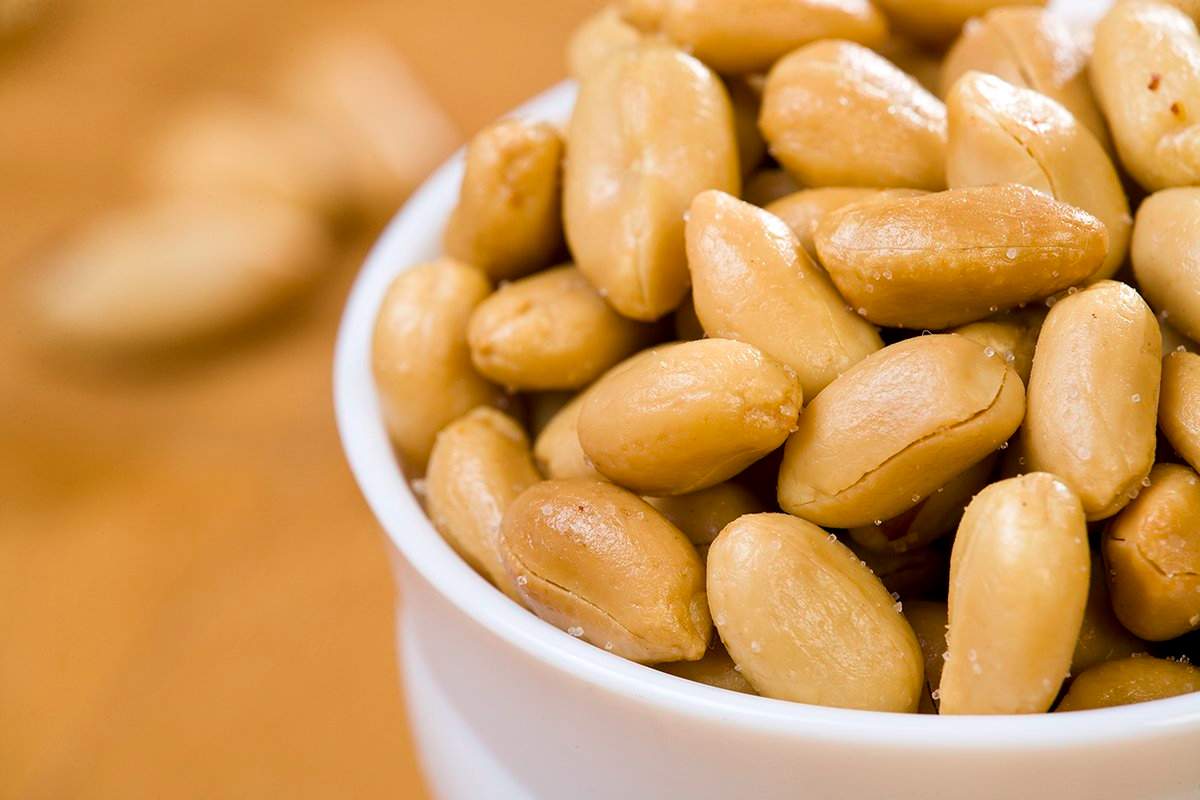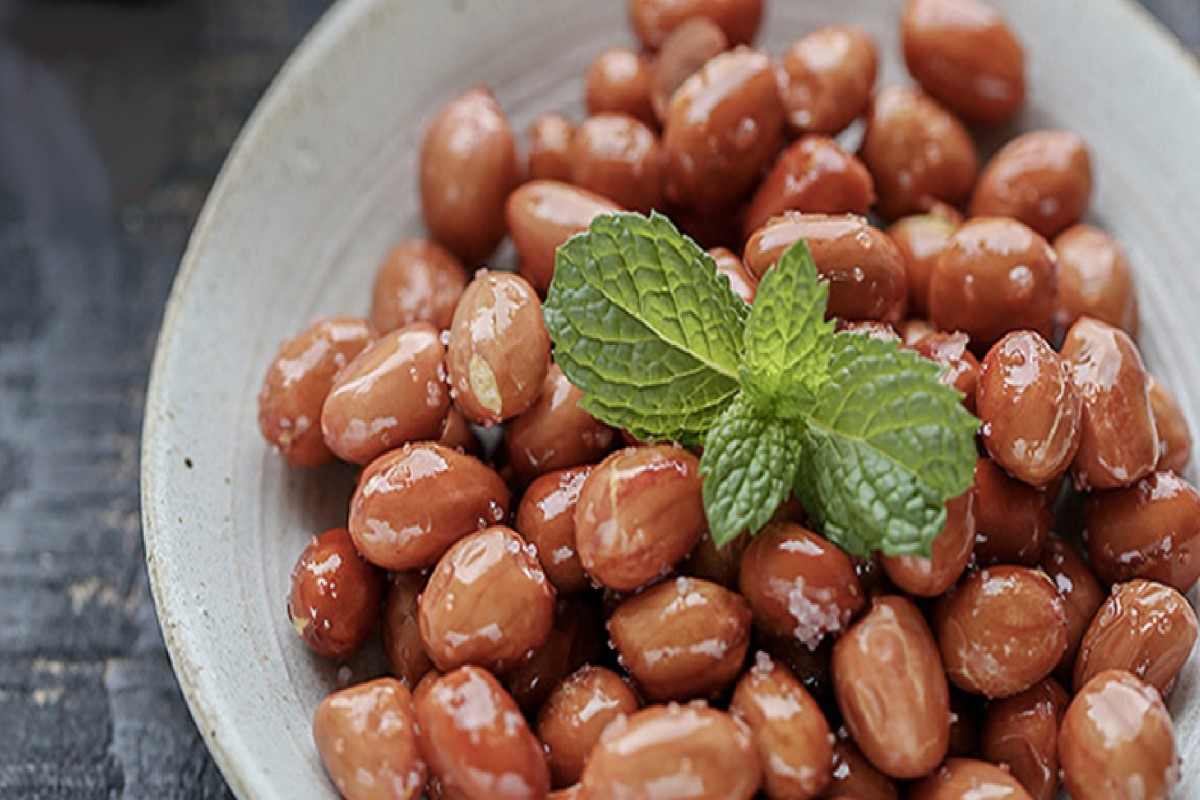Peanuts are a common ingredient in many kitchens. It might make you question whether salted peanuts are good for your health at all. It seems like all the attention in recent years has been on almonds, cashews, and other nuts. Just think about how many different kinds of nut butter and milk you can find in the grocery store. Here, we'll answer that question (hint: they are) by going into detail about their nutrition and health benefits. We'll also show you some fun ways to put them on your plate.
- What Peanuts Are Good For
Peanuts are cheap, can last for a long time, fill you up, and are good for you. Peanut butter and peanuts, in general, can be used in both sweet and savory dishes, like Pantry Peanut Noodles and No-Bake Peanut Butter Chocolate Cookies.  The nutrition facts for 1 ounce of raw, unroasted peanuts with no added salt are as follows:
The nutrition facts for 1 ounce of raw, unroasted peanuts with no added salt are as follows:
- 160 calories
- 7g protein
- 14g fat
- 5g carbs
- 4g fiber
- 68 mcg folate
- 49mg magnesium
- 196mg potassium
- 7mg iron
- 3mg sodium
Peanuts are a food that is high in both energy and nutrients. They have a combination of fiber, protein, and fat that makes you feel full and helps you feel energized after a meal. And they have a lot of important nutrients like iron, magnesium, potassium, and folate. They only have 3 milligrams of sodium per serving when they are raw (not roasted) and not salted. About 0.3 grams more fat per serving is added when peanuts are roasted. And one serving of salted peanuts can have more than 100 mg of sodium, which is a lot since the daily limit for sodium is 2,300 mg (and 1,500 mg for people with high blood pressure or heart disease). There are also options for peanuts and other nuts that are only lightly salted. This helps bring down the sodium, which is usually less than 50 mg per serving. Peanuts are good for your health. 
- They are full of antioxidants.
Researchers have found that peanuts are a "functional food" because they have a lot of antioxidants. Some of these antioxidants are phenolic acids and flavonoids, which can also be found in apples, red wine, red tea, and soybeans. Surprisingly, the antioxidant content of peanut skins is higher than that of the whole peanut. This is a great reason to buy peanuts in their shells and shell them yourself. Researchers have found that the anti-inflammatory properties of peanuts may help lower the risk of diabetes, heart disease, and even some types of cancer. So, sprinkle some crushed peanuts on your salad or soup, and spread peanut butter on your toast in the morning.
- They can help it be easier to lose weight and keep it off.
Even though nuts, like peanuts, seem to have a lot of calories, they are a great snack if you are trying to lose weight or stay at a healthy weight. Peanuts have protein, fiber, and healthy fats, which can help you feel full and satisfied between meals. This might keep you from eating too much when you are hungry. In fact, research has shown that nuts may play an important role in controlling weight and that eating nuts is linked to being overweight (meaning the more often you eat nuts, the less likely you are to be obese). In one study, it was found that eating 1 ounce of peanuts every day not only made the diet better but also helped people keep a healthy weight.
- They're good for your heart
Peanuts have both soluble and insoluble fibers, which are good for your heart in many ways. One of these is that they help lower LDL cholesterol or "bad" cholesterol. Peanuts also have niacin, which is a type of vitamin B3 that is important for a healthy heart. In one study, people who ate just over 1 ounce (42 grams) of peanuts every day for 12 weeks saw their blood pressure, cholesterol, and triglyceride levels go down.  Plus, the antioxidants in peanuts can help lower the risk of coronary heart disease because they fight inflammation.
Plus, the antioxidants in peanuts can help lower the risk of coronary heart disease because they fight inflammation.
- They can help keep blood sugar levels even.
Researchers have found that nuts, like peanuts, can help lower the risk of getting diabetes and make life better for people who already have it. In fact, a recent review of studies found that eating peanut butter was linked to a lower risk of type 2 diabetes. As if you needed another reason to spread peanut butter on toast or eat it with fruit, this is it. In another study, it was found that eating nuts like peanuts as a snack could also help people with diabetes avoid complications. People with diabetes who ate more nuts had an 11% lower chance of cardiovascular disease, a 15% lower chance of coronary heart disease, and a 27% lower chance of dying from any cause.
- They are good for the environment
Peanuts are one of the nuts that you can buy for the least amount of money. Even though prices went up because of the pandemic, you can usually get a serving of peanuts or peanut butter for less than 20 cents. Not only are they cheap, but they also help the environment in some ways. An ounce of peanuts only needs about 3.2 gallons of water to grow, while an ounce of almonds needs about 28.7 gallons of water. Peanuts are also nitrogen-fixing plants, which means that they take nitrogen out of the air and put it back into the soil so that other plants can use it as fuel (they do this through bacteria that grow in their roots, called rhizobium). Peanuts might be the most sustainable nut because they are cheap, easy to find, and don't hurt the environment as much as other nuts do.  In conclusion Peanuts are healthy and cheap, and many of us have had them in our pantries for as long as we can remember. Regular use may also improve heart health, lower the chance of getting diabetes, and help people stay at a healthy weight. Plus, they have less of an impact on the environment than other popular nuts. Check out some of our favorite peanut butter recipes to get your fill today.
In conclusion Peanuts are healthy and cheap, and many of us have had them in our pantries for as long as we can remember. Regular use may also improve heart health, lower the chance of getting diabetes, and help people stay at a healthy weight. Plus, they have less of an impact on the environment than other popular nuts. Check out some of our favorite peanut butter recipes to get your fill today.
